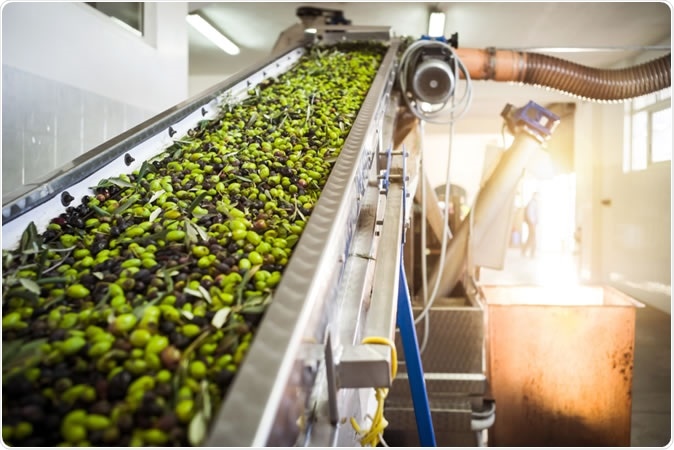Researchers from the Lewis Katz School of Medicine at Temple University have found that extra virgin olive oil (EVOO) could help boost brain power and halt the progression of the effects of aging on the brain. The study was published in the latest issue of the journal Aging Cell, and it was titled, “Extra virgin olive oil improves synaptic activity, short‐term plasticity, memory, and neuropathology in a tauopathy model.”

Manufacturing extra virgin Olive Oil in Mola di Bari, Puglia - Image Credit: Sabino Parente / Shutterstock
In a new study, also conducted on lab mice, reveals that EVOO can benefit another group of dementia-related pathology called tauopathies. An abnormal protein called tau protein can build up within the brain and can lead to dementia and slow the decline in cognitive functions, wrote the researchers. This study reveals that the use of EVOO can help prevent a specific decline of the mental faculties called frontotemporal dementia that is seen with tauopathies.
The team of researchers explained that tauopathies and dementia affects different parts of the brain. Alzheimer’s disease, for example, affects the hippocampus region, which deals with memory. Frontotemporal dementia, on the other hand, affects the frontal lobe and the temporal lobes. These are present at the forehead and sides of the head, respectively. Frontotemporal dementia is usually seen between the ages of 40 and 65 years and there are alterations in personality traits, language, handwriting, behaviors, etc. With time, there is a deterioration of memory and cognitive functions.
One of the senior researchers, Domenico Praticò, MD, Scott Richards North Star Foundation Chair for Alzheimer's Research, Professor in the Departments of Pharmacology and Microbiology, and Director of the Alzheimer's Center at Temple, in his statement said, “EVOO has been a part of the human diet for a very long time and has many benefits for health, for reasons that we do not yet fully understand. The realization that EVOO can protect the brain against different forms of dementia gives us an opportunity to learn more about the mechanisms through which it acts to support brain health.”
For the Alzheimer’s disease study, they had used mice modeled to develop the disease. They fed the mice on EVOO and when their brains were dissected on death, there were no features of brain damage and deposits of the abnormal proteins within their brains. EVOO-fed mice were also found to have normal cognitive functions.
In this new study, they took mice that were genetically engineered (hTau mice) to develop tauopathy or deposits of abnormal protein tau in their brains. The tau usually forms tangles and deposits in various parts of the brain. These tangles cause blockage in the neuron communications and thus impair memory and thinking. In humans, this leads to frontotemporal dementia.
Mice designed to develop tauopathies were then put on a diet of EVOO supplementation from a young age (corresponding to age 30 to 40 years in humans). At six months of age (corresponding to a human age of 60 years) the mice were found to have a 60% reduction in the tau protein deposits in their brains. These mice were also found to have a 60% reduction in the formation of damaging tau deposits in their brains. The synapse functions were better in these mice and they also had higher levels of a protein called complexin-1. This protein is found to be important for maintaining healthy neural connections or synapses. They tested the mice for memory and learning tests and found that the mice fed on EVOO did well on those tests as well.
Our findings demonstrate that EVOO directly improves synaptic activity, short‐term plasticity, and memory while decreasing tau neuropathology in the hTau mice. These results strengthen the healthy benefits of EVOO and further support the therapeutic potential of this natural product not only for AD but also for primary tauopathies.”
Lewis Katz School of Medicine, Temple University
They wrote that the results, “provide strong preclinical evidence in support of the novel concept that EVOO should be considered as a potential and viable multi‐targeting agent not only for AD but also for primary tauopathies.”
As a next step, the team plans on using EVOO in older mice and see if it can reverse the signs of cognitive decline and reverse the tau tangles and deposits.
We are particularly interested in knowing whether EVOO can reverse tau damage and ultimately treat tauopathy in older mice."
Dr. Praticò, Lewis Katz School of Medicine, Temple University
Journal reference:
Lauretti, E, Nenov, M, Dincer, O, Iuliano, L, Praticò, D. Extra virgin olive oil improves synaptic activity, short‐term plasticity, memory, and neuropathology in a tauopathy model. Aging Cell. 2019; 00:e13076. https://doi.org/10.1111/acel.13076, https://onlinelibrary.wiley.com/doi/full/10.1111/acel.13076